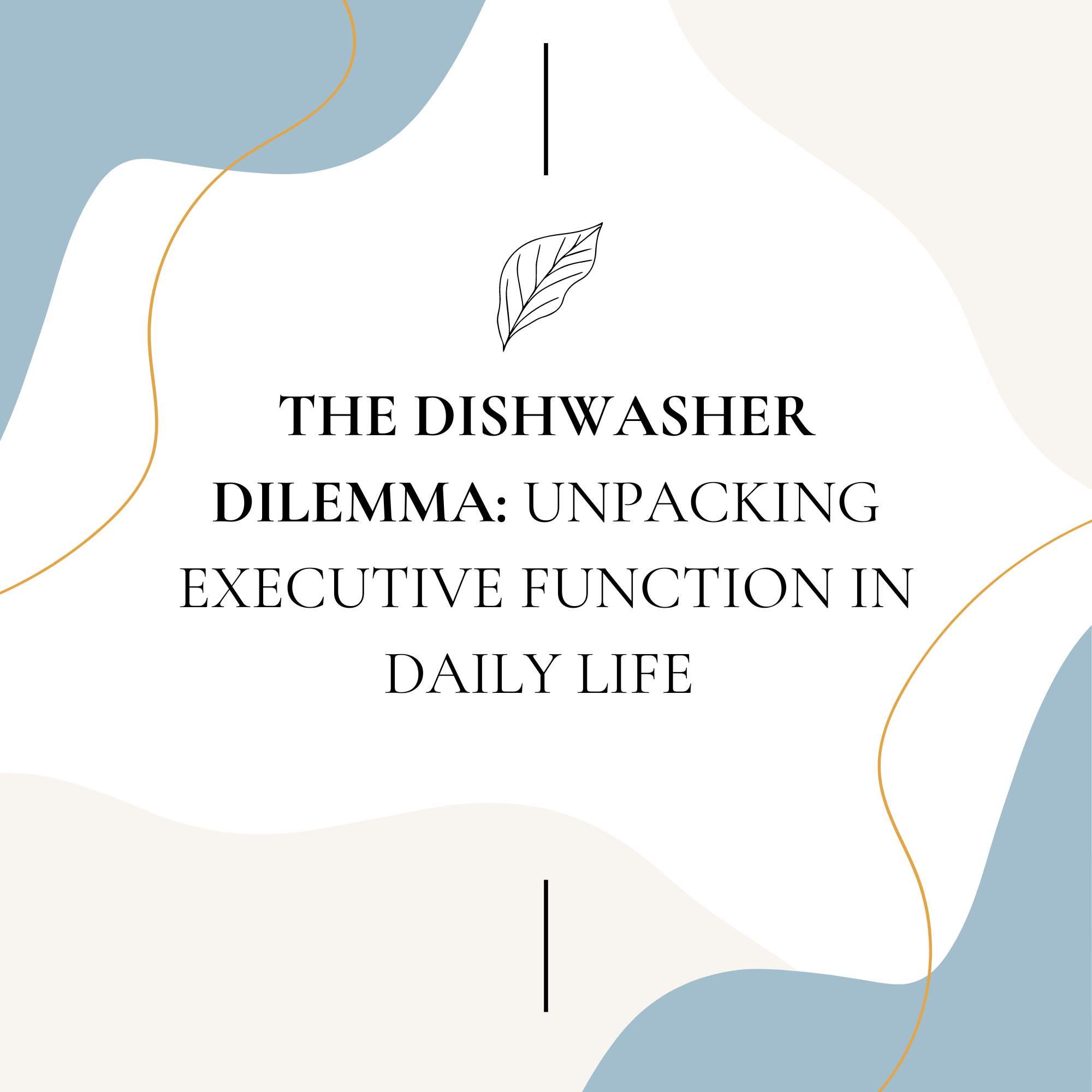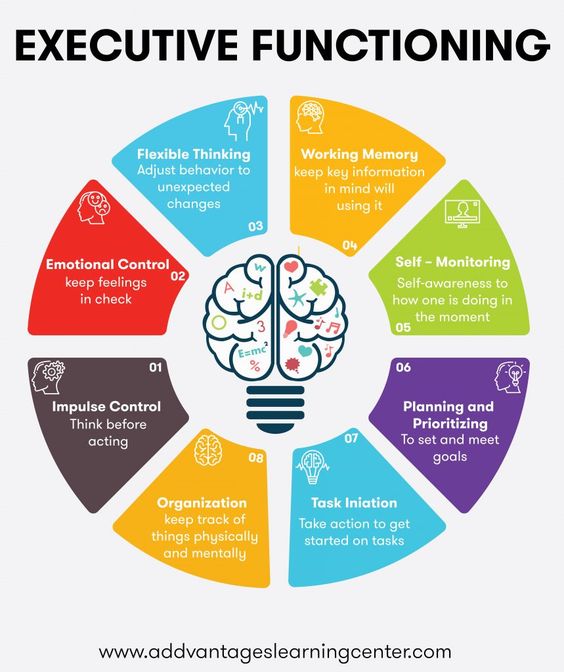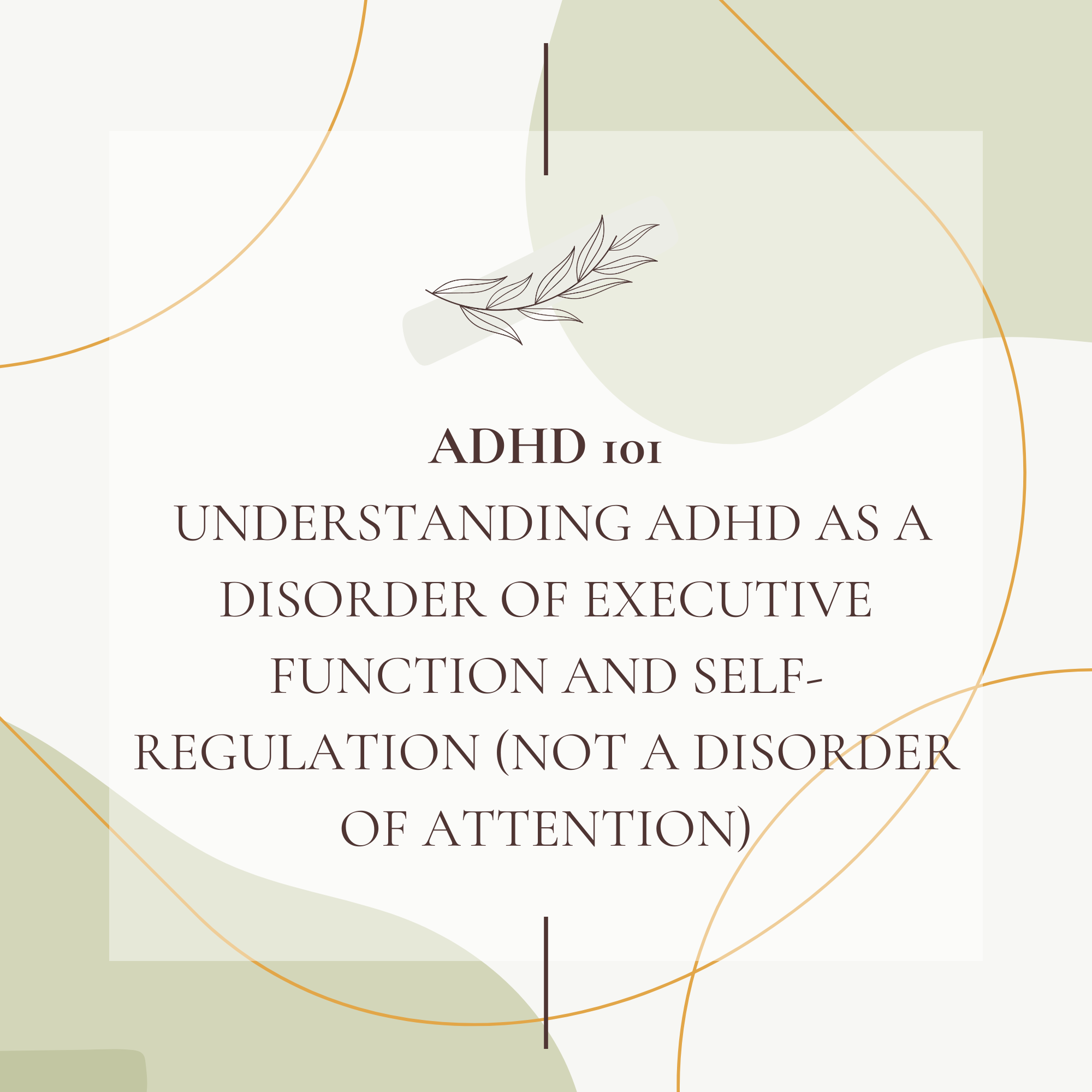
Disclaimer: This post/article/blog is for informational purposes only and is not a substitute for professional mental health advice, diagnosis, or treatment. Always seek the advice of qualified health providers with any questions you may have regarding mental health concerns.
Infographics were created by a mix of professionals and people with ADHD and selected by Katie to reflect what she has experienced personally and professionally.
Table of Contents
The Dishwasher Dilemma: Unpacking Executive Function in Daily Life

Hi, I'm Katie.
I’m a neurodivergent mental health counselor. I specialize in helping neurodivergent adults navigate complex intersectional identities and comorbid mental health, trauma, or substance use.
This blog is shaped by my own education and experiences as a therapist. It's not a definitive resource, not a textbook to be quoted or a manual to be followed. Instead, it's an offering—by someone with an unusual mix of perspectives and skills. Someone who has spent too long living in and witnessing the growing disconnect between people and the cost of harmful misunderstandings.
Introduction

In conversations with my family and clients, I've discovered that seemingly mundane household tasks often reveal profound insights into cognitive functioning. One particularly telling example I've encountered in my practice revolves around a surprisingly contentious household appliance: the dishwasher. How individuals approach the dishwasher loading, running, and unloading can provide information about their executive function skills.
While I don't specialize in couples therapy, clients often discuss household conflicts in our sessions. These disputes, particularly around shared tasks like managing the dishwasher, offer valuable insights into an individual's cognitive processes and potential areas of executive dysfunction.
Understanding Executive Function
Before we delve into the specifics of the dishwasher dilemma, it's essential to understand what we mean by executive function. Executive functions are cognitive processes that enable us to plan, focus attention, remember instructions, and juggle multiple tasks successfully. These skills are crucial for goal-directed behavior, allowing us to manage our daily lives effectively.
Critical components of executive function include:
- Working memory
- Cognitive flexibility
- Inhibitory control
- Planning and prioritization
- Task initiation
- Organization
- Time management
- Emotional regulation (while not traditionally considered an executive function, it's closely tied to these processes)
Everyone has strengths and weaknesses in different areas of executive function. Understanding these differences can be crucial in addressing personal challenges and improving overall functioning.
The Dishwasher Routine: More Than Meets the Eye
Issues with the dishwasher might seem trivial. However, they often point to deeper issues related to executive function.
Let's break down how different aspects of the dishwasher routine can illuminate specific areas of executive function:
Planning and Organization
How it manifests: Some individuals meticulously arrange dishes for maximum efficiency, while others toss items in haphazardly.
What it reveals: This can indicate differences in planning and organizational skills. Meticulous loading may suggest more vital skills in this area, while haphazard loading might indicate struggles with spatial organization or a different task prioritization.
Deeper dive: Efficiently loading a dishwasher requires several executive function skills. It involves spatial reasoning to maximize the use of space, categorization to group similar items together, and planning to ensure that the dishwasher will adequately clean all items. For someone with strong organizational skills, this process might be almost automatic. They might have a mental map of the optimal dishwasher layout and be able to quickly sort and place items accordingly.
On the other hand, someone who struggles with organization might find this task overwhelming. They might not see loading the dishwasher as a puzzle to solve but rather as a chore to complete as quickly as possible. This approach could result in inefficient loading, where they place dishes randomly and poorly utilize space.
Task Initiation and Completion
How it manifests: Dishes piling up in the sink or clean dishes remaining in the dishwasher for days.
What it reveals: Difficulties with task initiation (starting the loading or unloading process) or task completion (following through to the end) are common executive function challenges.
Deeper dive: Task initiation and completion are crucial executive function skills impacting many life areas. With the dishwasher, we can see these skills (or lack thereof) in action. A person who struggles with task initiation might leave dirty dishes in the sink for days, even when they have the time and energy to load the dishwasher. They may feel overwhelmed about starting the task and continuously put it off. This behavior doesn't stem from laziness but from the cognitive effort required to switch from one activity to another and begin a new task.
On the flip side, someone who struggles with task completion might excel at loading the dishwasher but leave clean dishes sitting in it for days. They start the task but have difficulty following through to completion. They might need to remember the clean dishes (indicating a working memory issue) or struggle to motivate themselves to finish a task that doesn't offer an immediate reward.
Time Management
How it manifests: Uncertainty about when to run the dishwasher or how long dishes can sit before being washed.
What it reveals: Time management and the ability to estimate how long tasks will take are essential executive functions. Issues here can point to differences in how individuals perceive and manage time.
Deeper dive: Effective time management for dishwashers involves several skills. It requires the ability to estimate how long it will take for the dishwasher to fill up, judge when it's most efficient to run it, and plan when to unload it.
Someone with solid time management skills might run the dishwasher every evening after dinner, knowing they will fill it and can unload it in the morning. They might also excel at estimating how long they can leave dishes before food becomes difficult to clean off.
In contrast, someone who struggles with time management might let dishes pile up for days, suddenly realizing they have no clean plates left. Or they might run the dishwasher when it's only half full because they've lost track of how long it's been since it was last run.

Working Memory
How it manifests: Forgetting to add detergent or repeatedly asking where specific items go.
What it reveals: Working memory is crucial for remembering the steps involved in tasks we don't do constantly. Struggles here can manifest as forgetfulness or the need for frequent reminders.
Deeper dive: Working memory is our ability to hold information in mind and manipulate it. In the context of the dishwasher, this involves remembering all the steps involved in the process: rinsing dishes, loading them correctly, adding detergent, starting the cycle, and later remembering to unload it.
Someone with a strong working memory is more likely to multitask effectively. For example, they might load the dishwasher while also preparing lunch without forgetting any steps. They can hold the 'mental checklist' while focusing on other tasks.
On the other hand, someone with working memory challenges might frequently need to remember to add detergent or start the dishwasher without adequately closing it. They might also need help remembering where specific items go, even if others have told them multiple times.
Cognitive Flexibility
How it manifests: The person insists on one "correct" way to load the dishwasher or cannot adapt when they need to accommodate new items.
What it reveals: Cognitive flexibility allows us to adapt to new situations and think about things differently. Rigidity around dishwasher loading can indicate challenges in this area.
Deeper dive: Cognitive flexibility is about adapting to new or unexpected situations. With the dishwasher, this might involve figuring out how to fit in a huge pot or adjusting the loading strategy when you're running low on detergent and need to maximize each load.
Someone with high cognitive flexibility might enjoy the challenge of fitting everything into one load and creatively arranging items to make it work. They might also quickly adapt to different dishwashers when visiting friends or staying in a vacation rental.
A person who struggles with cognitive flexibility might become frustrated when someone or something disrupts their usual loading pattern. They might insist on always putting glasses in a specific spot, even if they could load a particular batch more efficiently. They might also struggle to use a different type of dishwasher or adapt to new, more efficient loading techniques.
Attention to Detail
How it manifests: Missing food particles on dishes or not noticing when items are still dirty.
What it reveals: Attention to detail is essential in executive function. People may experience frustration when others don't complete tasks to the expected standard due to differences in their abilities.
Deeper dive: Attention to detail involves focusing on and noticing small elements of a task. With the dishwasher, this includes thoroughly rinsing dishes before loading, noticing if items come out clean, and observing if the dishwasher itself needs cleaning.
An individual with strong attention to detail might consistently load the dishwasher in a way that ensures everything gets clean. They're likely to notice and remove any items that didn't get thoroughly cleaned in the last cycle, and they might be the first to realize when the dishwasher needs maintenance.
Someone who needs help with attention to detail might consistently leave food particles on dishes, reducing the dishwasher's effectiveness. They might not notice when dishes are dirty, or the dishwasher develops an odor, indicating it needs cleaning.
Emotional Regulation
How it manifests: Disproportionate anger or frustration over dishwasher-related issues.
What it reveals: While not traditionally considered an executive function, emotional regulation is closely tied to these cognitive processes. Intense emotional responses to dishwasher disputes can indicate challenges in managing emotions in the face of frustration.
Deeper dive: Emotional regulation involves managing our emotional responses to various situations. While not typically classified as an executive function, it's closely related and can significantly impact how we handle tasks like managing the dishwasher.
A person with good emotional regulation might feel momentary frustration if they open the dishwasher to find dirty dishes, but they can quickly move past it and problem-solve. They can keep the issue in perspective and not let it ruin their day.
Someone who struggles with emotional regulation might have an outsized reaction to dishwasher-related issues. They might become disproportionately angry if someone loads the dishwasher "incorrectly" or feel overwhelmed to the point of giving up if they encounter a pile of dirty dishes.
The Impact on Daily Functioning
These executive function differences can create significant challenges in daily life. Individuals with weaker skills in particular areas may feel constantly overwhelmed or criticized, while those with stronger skills might feel frustrated or overburdened. Over time, these minor issues can impact self-esteem, productivity, and overall well-being without understanding and appropriate strategies.
For instance, someone who consistently struggles with task initiation might start to see themselves as "lazy" or "unmotivated," not realizing that they're dealing with an executive function challenge. This negative self-perception can spill over into other areas of life, affecting work performance and relationships.
Similarly, a person with difficulty with organization and planning might find their struggles with the dishwasher mirrored in other areas of their life, such as keeping their workspace tidy or managing their schedule effectively.
Moving Forward: Strategies for Individuals
The first step is understanding that dishwasher dilemmas often reflect broader executive function challenges. Here are some strategies individuals can use to address these issues:
- Recognize Individual Differences: Understand that executive function skills vary from person to person and do not reflect intelligence or effort. This self-awareness can be the foundation for improvement.
- Play to Strengths: Focus on tasks that align with your strengths and consider delegating or finding alternative solutions for challenging areas. If you're great at organizing but struggle with task initiation, you might set up a detailed system for loading the dishwasher but ask for help remembering to start it.
- Create Systems: Develop transparent, visual systems for household tasks that support challenge areas. This might include a chart showing where items go in the dishwasher or a checklist of steps involved in the dishwashing process.

- Use Technology: Set reminders to initiate or complete tasks. For example, a simple phone alarm can serve as a cue to start loading or unloading the dishwasher.
- Practice Self-Compassion: Approach your challenges with curiosity and empathy rather than judgment. Remember that everyone has areas of strength and weakness in executive function.
- Break Tasks into Smaller Steps: If loading the dishwasher feels overwhelming, break it down into smaller tasks. Start by clearing the sink, then rinsing the dishes, and then loading a few items at a time.
- Use Timers: For those who struggle with time management, using a timer can help. Set a 10-minute timer for loading the dishwasher and see how much you can get done in that time.
- Implement the "One In, One Out" Rule: To prevent dishes from piling up, try to get in the habit of putting a dish in the dishwasher every time you take a clean one out.
- Create Routines: Link dishwasher tasks to other daily activities. For example, start the dishwasher every night after dinner or unload it every morning while waiting for your coffee to brew.
- Seek Professional Help: A mental health professional can help identify specific executive function challenges and develop tailored strategies. Cognitive-behavioral therapy and other therapeutic approaches can effectively improve executive function skills.
Conclusion: The Dishwasher as a Conversation Topic
While it might seem unlikely, the humble dishwasher can be a powerful conversation topic. It provides an everyday example of how executive function differences manifest in real life. By understanding these dynamics, individuals can move beyond self-blame and frustration to develop strategies for their unique cognitive profile.
Remember, the goal isn't to achieve perfect execution of household tasks but to better understand our cognitive processes and find solutions that improve daily functioning. In doing so, individuals can turn familiar sources of frustration into opportunities for self-awareness, growth, and improved life satisfaction.
So, the next time you face a dishwasher dilemma, step back. Consider what it might be revealing about your cognitive processes. You might find that your dishwasher has more to teach you about your brain than you ever imagined. And remember, just as every dishwasher load is different, every brain is unique. The key is finding the best strategies for you, one dish at a time.
We welcome all people, regardless of race, ethnicity, age, religion, gender identity, sexual identity, relationship status, body composition, or disability. We pledge to provide a safe space for our team and our clients.
Recent Posts




